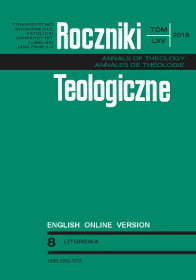The Canon Missae in Rupert of Deutz O.S.B.’S. Allegorical Interpretation
Abstrakt
At the heart of the celebration of the Eucharist is the Eucharistic Prayer, during which the mystery of Christ is made present. In the Latin liturgy of the Western Church, for centuries the priest always recited the same Eucharistic Prayer at the Holy Mass from the Roman Canon. This oldest liturgical text was built symmetrically around the words of the institution that Jesus spoke over the bread and wine. The structure of the Canon itself was shaped over several centuries, but the proper arrangement was known already in the 7th and 8th centuries. The Canon of the Mass has been for centuries the basis for the theological interpretation of individual texts, gestures and signs. Particularly since the Middle Ages, they were explained on the basis of their allegorical interpretation. This way of interpreting the Mass was known since the 8th century and consisted of a moralizing, typological, commemorative, eschatic and an anagogical presentation of all liturgical rites. The treatise Liber de divinis officiis by Rupert of Deutz is one of the most important texts dedicated to the liturgy in the Middle Ages. Rupert of Deutz explained the celebrations of the Mass in the second book of his work. In the first place, he points to the Passion’s interpretation in the Canon, from the moment Jesus entered Jerusalem to His body being placed in the grave. The Passion is also emphasized by the sign of the cross made by the priest at the time of the Canon, which symbolizes the wounds of Christ. The allegorical interpretation of the Mass Canon, made by Rupert of Deutz, is part of the theological tradition of the Middle Ages. Although he did not discuss all of the texts in the Canon, he did interpret its essential parts.
Bibliografia
Ambrosius, De sacramentis libri sex, PL 16, 417–462.
Beinert, Wolfgang. “Rupert v. Deutz,” in Lexikon des Mittelalters, Bd. VII (München: dtv, 1995), col. 1103.
Benedict XVI, “General Audience: Rupert of Deutz” [9 XII 2009]. Osservatore Romano (Polish edition) 320, no. 2 (2010): 49–51.
Cozel, Feliks. Msza Święta. Jej znaczenie, korzyści, obrzędy i sposoby słuchania [The Holy Mass. Its Meaning, Benefits, Rites and Ways of Attending]. Warsaw: Te Deum, 1998.
Deutz, Helmut i Ilse. “Einleitung.” In Rupert von Deutz, Liber de divinisofficiis. Der Gottesdienst der Kirche, Erster Teilband, hrsg. von Hrabanus Haacke, 21–130. Freiburg–Basel–Wien–Barcelona–Roma–New York: Herder, 1999.
Engelbert, Pius. “Rupert v. Deutz.” In Lexikon für Theologie und Kirche, 3. Auflage, hrsg. von Walter Kasper, Bd. VIII, col. 1366–1367. Freiburg: Herder, 1999.
Gamber, Klaus. W stronę Pana! [Toward the Lord!]. Translated by Anna Huculak. Rzeszów: Wydawnictwo św. Bpa Józefa Sebastiana Pelczara, 2012.
Innocentius III. De sacro altaris mysterio. Libri Sex. PL 217, 773–967.
Jougan, Alojzy. Słownik kościelny łacińsko-polski [Latin-Polish Church Dictionary]. Sandomierz: Wydawnictwo Diecezjalne i Drukarnia, 20135.
Jungmann, Josef Andreas. Liturgia pierwotnego Kościoła do czasów Grzegorza Wielkiego [The Early Church Liturgy to the Times of Gregory the Great]. Translated by Teresa Lubowiecka. Kraków–Tyniec: Wydawnictwo Benedyktynów, 2013.
Jungmann, Josef Andreas. Missarum sollemnia. Eine genetische Erklärung der römischen Messe, Bd. II. Wien: Herder, 19625.
“Konstytucje Apostolskie.” In Konstytucje apostolskie oraz Kanony Pamfilosa […], (Synody i Kolekcje Praw, vol. II) [Apostolic Constitution, in: Apostolic Constitutions and Canons by Pamphilius … (Synods and Collected Works, vol. II))], edited by Arkadiusz Baron, Henryk Pietras. Kraków: Wydawnictwo WAM, 2007.
Lengeling, Emil Joseph. Die neue Ordnung der Eucharistiefeier. Kommentar der Dokumente zum Römischen Meßbuch. Leipzig: St.-Benno-Verlag, 1970.
Lustiger, Jean-Marie. Die Heilige Messe. Translated by Cornelia Capol. Einsiedeln–Freiburg: Johannes, 19982.
Martimort, Aimé Georges. Handbuch der Liturgiewissenschaft, Bd. I. Freiburg im Breisgau: Herder, 1963.
Meyer, Hans Bernhard. “Eucharistie.” In Gottesdienst der Kirche. Handbuch der Liturgiewissenschaft, part 4, hrsg. von Hans Bernhard Meyer; Franz Bartunek; Josef Andreas Jungmann. Regensburg: Pustet, 1989.
Missale Romanum ex decreto SS. Concilii Tridentini Restitutum Summorum Pontificum cura recognitum. Editio Typica, Typis Polyglottis Vaticanis, 1962.
Nadolski, Bogusław. Eucharystia. Jej miejsce i rola w życiu chrześcijanina [The Eucharist. Its Place and Role in a Christian’s Life]. Kraków: Wydawnictwo WAM, 2006.
Niparko, Romuald. “Anamneza. III. W liturgii.” In Encyklopedia katolicka [Anamnesis. III. In the Liturgy], vol. I, col. 512–513. Lublin: TN KUL, 1973.
Nowowiejski, Antoni Julian. Msza święta [The Holy Mass], part 1. Sandomierz 1992.
Paprocki, Henryk. Misterium Eucharystii. Interpretacja genetyczna liturgii bizantyjskiej [The Mystery of the Eucharist. Genetic Interpretation of the Bizantine Liturgy]. Kraków: Wydawnictwo WAM, 2010.
Rupert von Deutz. Liber de divinis officiis. Der Gottesdienst der Kirche, Erster Teilband, hrsg. Von Hrabanus Haacke. Freiburg–Basel–Wien–Barcelona–Roma–New York: Herder, 1999.
Sokołowski, Paweł. “Rupert of Deutz.” In Encyklopedia katolicka [Catholic Encyclopedia], vol. XVII, kol. 597–598. Lublin: TN KUL, 2012.
Weiss, Anzelm. “Inwestytura.” In Encyklopedia katolicka [Investiture, in: Catholic Encyclopedia], vol. VII, col. 419–422. Lublin: TN KUL, 1987.
Zahajkiewicz, Marek. “Expositio missae.” In Encyklopedia katolicka [Catholic Encyclopedia], vol. VI, col. 1467–1468. Lublin: TN KUL, 1973.
Copyright (c) 2018 Roczniki Teologiczne

Utwór dostępny jest na licencji Creative Commons Uznanie autorstwa – Użycie niekomercyjne – Bez utworów zależnych 4.0 Międzynarodowe.





